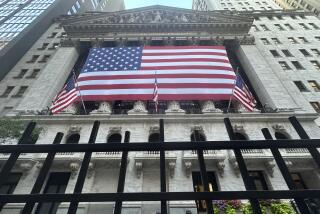Late Rally Lifts Dow on Lackluster Day
- Share via
Wall Street muddled through a dull session on Monday, as optimists and pessimists continued their tug of war amid the aftershocks of Russia’s latest political earthquake.
U.S. stocks ended a lethargic trading session broadly but modestly lower.
The Dow Jones industrial average added 32.96 points, or almost 0.4%, to 8,566.61. However, declining issues beat advancers 1,650 to 1,420 on the New York Stock Exchange.
The Nasdaq composite fell 0.4%, to 1,790.82, as smaller stocks overall continued to slide.
In currency trading, the dollar fell against the yen on remarks by a top Japanese official, again threatening to bolster the yen.
Meanwhile, profit-takers chipped away at the U.S. Treasury bond market, where yields had fallen on Friday to record lows.
Asian stock markets set a poor tone for Wall Street on Monday, as Japanese stocks led most of the region’s markets lower on news that Russian President Boris N. Yeltsin had sacked his cabinet. In Tokyo, the Nikkei-225 index slumped 2% on Monday to 14,988.
But European markets were mixed. The German market rebounded 1.2% after tumbling on Friday.
And Latin American markets halted the downward spiral of last week, at least temporarily. While Brazilian stocks were off 1.4%, Mexican stocks were flat and Argentina’s market inched up.
On Wall Street, battling for the market’s soul were the optimists, who see bright prospects for the U.S. economy, and the pessimists, who worry about global instability.
Blue chips got a late boost from well-known bull Abby Joseph Cohen at Goldman Sachs, who reiterated her view of the market--that U.S. stocks are undervalued.
However, other analysts warn that political and economic uncertainty overseas won’t dissipate soon, and may worsen.
“What’s happened in Russia adds to the sense of uncertainty about what’s happening around the world,” said Robert Froehlich, chief investment strategist at Scudder Kemper Investments.
Jim Brophy, an analyst for BT Alex. Brown, said markets were worried about Russia’s stability and how it might affect countries such as Germany, which has large investments there.
German banks have $30 billion in outstanding loans in Russia. Last week, Russia in effect devalued the ruble, and the government announced measures that analysts say amount to a debt default.
But some Wall Street traders said investors saw Yeltsin’s cabinet shuffle as a positive development.
“The market likes a return to the old regime,” said Peter Coolidge, managing director of equity trading at Brean Murray & Co.
Still, U.S. blue chips never got much of a rally going Monday, despite the sharp turnaround on Friday, when the Dow surged from a midday loss of 280 points to close down less than 78 points.
In the bond market, some investors balked at accepting Friday’s record low yields on long-term Treasury issues. “The market has come so far so fast” that some people are reluctant to buy, said Susan Huang, who oversees $30 billion in bonds at Chase Asset Management.
Treasuries on Friday posted the biggest gain in more than two months as tumbling bond and currency markets in Russia and Latin America, and falling stocks around the world, drove investors to the relative safety of U.S. debt.
On Monday, the yield on the 30-year T-bond inched up to 5.46% from Friday’s record low of 5.44%.
In currency markets, the dollar fell to 143.95 yen on Monday from 144.91 on Friday on remarks by a top Japanese official published Monday in the Wall Street Journal.
Eisuke Sakakibara, the Japanese Ministry of Finance official known as “Mr. Yen” for his influence on exchange rates, said the currency markets may have been too pessimistic about the weakening yen and that the time may be right for Tokyo to intervene again to support the currency, as it did in June.
In the U.S. stock market, oil issues fell amid speculation that economic woes in Venezuela, Mexico and Russia will prompt those countries to pump more oil as they try to earn dollars and keep workers employed.
Union leaders in Venezuela urged the government to boost output as oil minister Erwin Arrieta prepares for a meeting later this week with Mexico and Saudi Arabia to discuss how to get oil prices out of a rut.
Venezuela’s stock market inched up 0.4% after plummeting last week.
Market Roundup, D14
More to Read
Inside the business of entertainment
The Wide Shot brings you news, analysis and insights on everything from streaming wars to production — and what it all means for the future.
You may occasionally receive promotional content from the Los Angeles Times.










